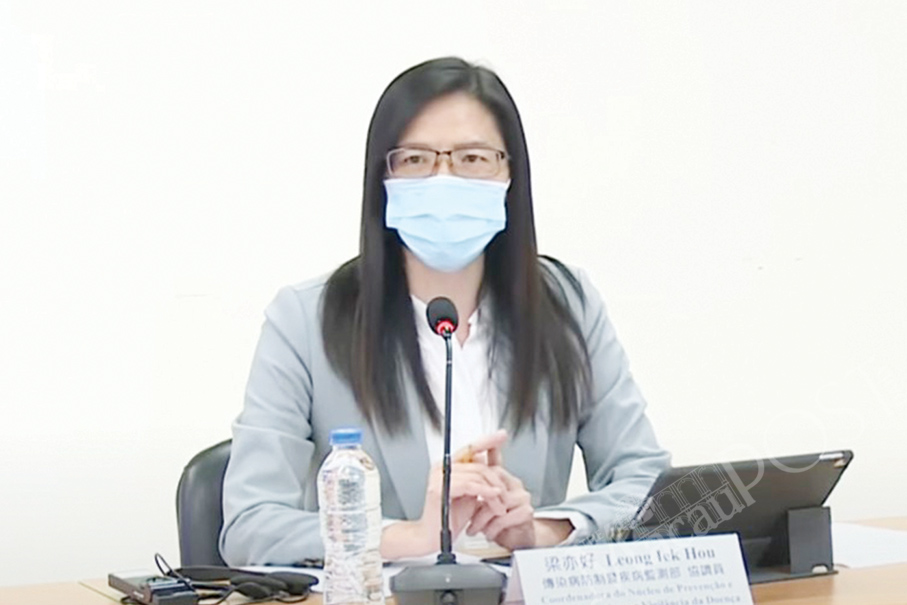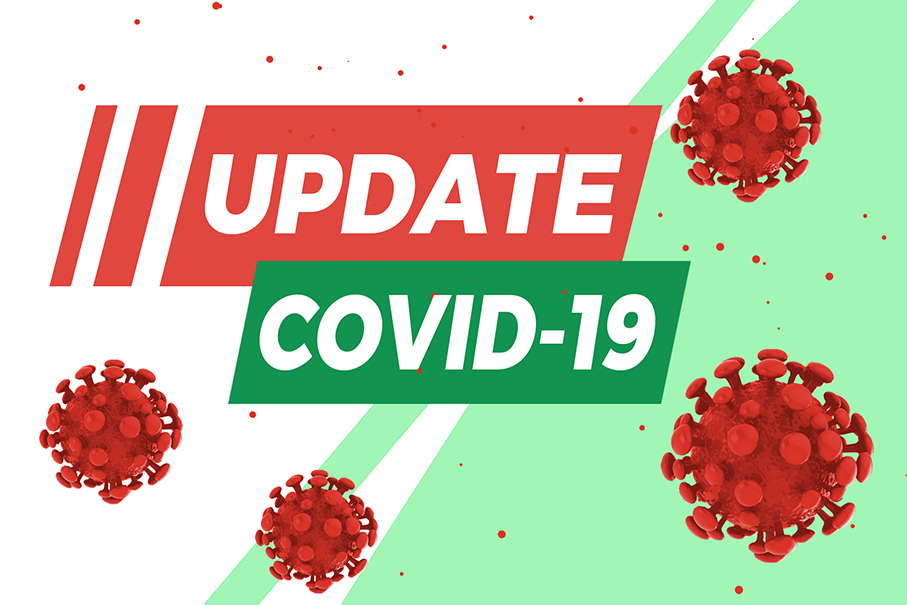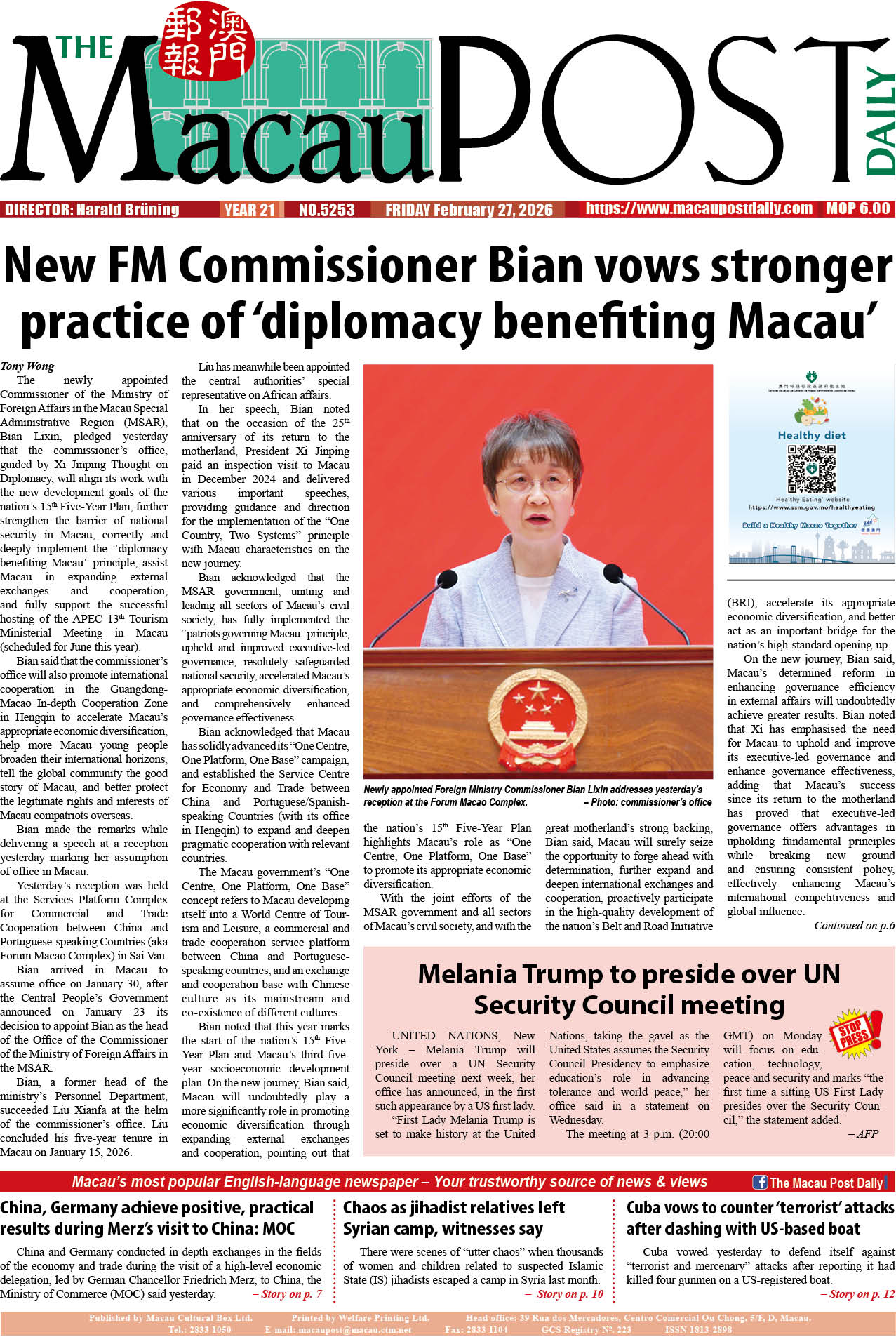Addressing yesterday’s press conference about Macau’s novel coronavirus situation, Health Bureau (SSM) Control of Communicable Diseases and Surveillance of Diseases Department Coordinator Leong Iek Hou announced that contact-tracing-function QR codes will become available at all social service facilities from Monday next week for Macau Health Code mobile app users to scan so that they can record their whereabouts on their smartphone – i.e., records showing that they have visited the respective facilities.
Leong also said that the government expects to place the QR codes at all medical institutions and facilities, restaurants and eateries, and various entertainment venues in the city by the end of next month – before the upcoming Chinese New Year, which falls on February 1.
The Health Bureau rolled out the mobile app version of the Macau Health Code that contains a contact tracing function last month.
The new contact tracing function enables residents to record their whereabouts accurately, which will help health officials in their epidemiological investigations in case the city is hit by new local COVID-19 cases.
Initially, after the Macau Health Code mobile app was launched about a month ago, the contact-tracing-function QR codes were only available at public medical institutions, namely the public Conde de São Januário Hospital Centre, public health centres and health stations, and other Health Bureau facilities. The use of the contact tracing function was extended to all government premises and facilities early this month, before it was also extended to public buses last week.
During yesterday’s press conference, Leong noted that after next Monday’s extension of the use of the Macau Health Code mobile app’s contact tracing function, the QR codes will be available at all government premises and facilities – including public medical institutions and facilities, all social service facilities, and public buses.
Leong also pledged that the government will continue to gradually extend the use of the contact tracing function to more premises and venues in the city. For the next phase, Leong said, the government is now working with the aim of ensuring that the contact-tracing-function QR codes will be available at all other medical institutions and facilities, restaurants and eateries, and various entertainment venues by the end of next month.
Leong also reported that as of 9 a.m. yesterday, 91,643 smartphone users had downloaded the Macau Health Code mobile app since its launch about a month ago. Leong reaffirmed that the health code mobile app has been running smoothly since its launch, pledging that the Health Bureau will keep gathering users’ opinions and suggestions with the aim of making constant improvements to the app.
The website version of the Macau Health Code remains operational, which means that smartphone users can choose to continue using the website version or switch to the mobile app version, when generating their health code. However, the new contact tracing function is only available on the mobile app version, as mobile web browsers are unable to scan a QR code.
The Health Bureau has underlined that while using the mobile app version, Macau Health Code users can choose whether or not to use the contact tracing function – scanning the QR codes placed on the premises and venues they are visiting. However, the bureau said last month that it will not rule out the possibility of requiring all those entering certain premises and venues to use the contact tracing function in case Macau confirms new local COVID-19 cases.
The Health Bureau has also reaffirmed that when using the contact tracing function, the users’ travel history records will only be stored on their smartphones after they scan the QR codes, and will not be uploaded onto the bureau’s database, as the function merely aims to help them record their whereabouts.
Omicron threat
Meanwhile, Leong also said during yesterday’s press conference that the latest findings and data of research studies worldwide have indicated that the Omicron variant is more contagious than other COVID-19 variants including Delta. However, Leong said, there are still insufficient data worldwide showing Omicron’s incubation period and its level of symptoms compared to other novel coronavirus variants.
Anyway, Leong said, the latest data has indicated that the Omicron variant, like all other variants, mainly spreads from an infected person’s mouth or nose in respiratory droplets, because of which, she said, the typical existing COVID-19 personal protection measure, such as wearing a facemask and social distancing, can effectively prevent Omicron infection.
The World Health Organisation (WHO) said earlier this month that the Omicron variant appeared to spread faster than the Delta variant, making vaccines less effective but causing less severe symptoms, while stressing that the data remains patchy.
Leong underlined yesterday that COVID-19 vaccines remain effective in preventing a serious condition of dying from the novel coronavirus disease in case a person is infected with the Delta or Omicron variant.
Leong also said that the latest findings of research studies worldwide have indicated that the administration of a third COVID-19 vaccine dose as a booster jab is able to significantly and quickly increase the person’s antibody levels, because of which, she said, the third dose will significantly raise the person’s immunity to prevent Omicron infection.
Meanwhile, Leong also told yesterday’s press conference that for the time being it is difficult for testing institutions that run the city’s regular nucleic acid testing (NAT) stations under the government’s NAT programme to further reduce the NAT fee, which currently stands at 70 patacas, due to Macau’s higher human resource cost and other administrative cost compared to the mainland.
Leong pointed out that Macau’s NAT fee has gradually decreased to the current 70 patacas from the original 180 patacas, when its NAT scheme was launched in May last year.

Health Bureau (SSM) Control of Communicable Diseases and Surveillance of Diseases Department Coordinator Leong Iek Hou addresses yesterday’s press conference about the city’s COVID-19 situation. Photo: GCS







